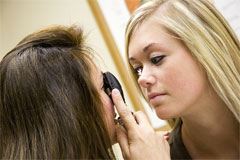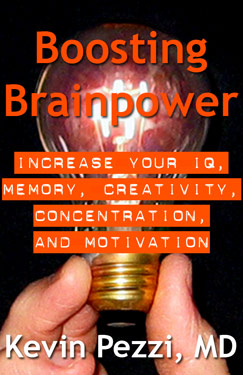Why female doctors could be superior to their male counterparts
by Kevin Pezzi, MD

As I mentioned on an earlier page, I am not trying to discourage women from becoming doctors. Women can become superb physicians and surgeons if they devote as much time and effort into their training as the best male doctors do.
In fact, I think that women docs could be superior to their male counterparts in some ways. How so? Women seem to be more innately caring about others, while men often evince a competitive need to put others down. Judging by what they say, many men evidently think that mocking or belittling others is humorous. Men tend to discuss superficial and meaningless things such as how their favorite professional sports teams are doing, while women tend to focus on people and their relationships. The latter are clearly more important than how well—or how poorly—overpaid and coddled professional athletes are performing. I can't think of anything less consequential than the outcomes of all sporting events. Is the world a better place because the Detroit Tigers win and the New York Yankees lose? Or vice-versa? It doesn't matter! It never does!
The countless billions of hours—and dollars!—that men waste every year on such inane activities could be better spent playing with their kids, helping their wives around the house, assisting elderly neighbors or family members, or feeding orphans in foreign countries who are starving and neglected. The male thirst for professional sports is really just a proxy for satisfying their intrinsic need for aggression and competition. Haven't we progressed enough as a species that we think about what we do throughout our lives rather than robotically acting out an inborn script? While testosterone and the other physiological underpinnings of masculinity tend to make men more competitive and less nurturing, that shouldn't preclude men from consciously channeling their competitive energy in more productive ways. I would rather spend the afternoon clearing four feet of snow from the driveway and porch of an elderly disabled person (as I've done) instead of watching sports. Or I'd rather make a present for a lonely patient, or do 1001 other things that matters more than sports.
I think that men often shy away from activities that might be perceived as being somewhat feminine because they don't possess enough resolute confidence in their masculinity. Thus, they dare not do things that I've done, such as bake cookies for neighborhood kids or baby-sit them free of charge, because doing so is just too wussy-like. Nonsense. One of my female friends says that I am the most unique man she's ever met. On one hand, I can do masculine things such as fix a furnace, use a chainsaw, or build something, such as the shed shown in the adjacent picture. On the other hand, I can be sensitive and nurturing, a great listener, talented in the kitchen, communicative, and genuinely concerned about others (even strangers). In short, I can do "feminine" things without that eroding my masculinity whatsoever. If I were as competitive as other men are, I might gloat that I can do things that 99% of men only dream of. I am very competitive, but only with myself. I rejoice in the triumphs of others, instead of downplaying those achievements, as other men often do. I don't need to puff my chest out and disparage others to feel good about myself.
Considering the foregoing, I believe that the female focus on emotions and relationships gives them a decided advantage over most men in the health professions because women truly manifest a greater concern for patients as people, not just blobs of protoplasm that need tinkering with. However, no amount of empathy, compassion, and interest in others can compensate for a lack of knowledge, so women who hope to excel in a medical career must be just as willing as men to make the personal and family sacrifices required to become a topnotch practitioner. I think that women place more value than men on childrearing and relationships in general, so women have a more difficult time giving up those things to devote an inordinate amount of time to becoming an outstanding doctor—which is exactly what it takes to reach the top of that profession. In conclusion, women can be just as talented as men in medicine if they are willing to put in equal time. The question is, is that really what you want to do?

What is the hardest part
of online dating?
Writing your profile and creating a
catchy headline. However, if you
use Dr. Pezzi's free MyProfileWriter,
you can compose a great profile that
will attract more people without typing.
Before you discard your aspirations of donning a white coat and becoming a doctor, I have a pleasant surprise for you: You can "have it all," or at least achieve far more than you ever thought possible, if you are willing to take the time to learn how to amplify your brainpower and efficiency.
I went from being a "slow" sixth grade student to a superb pre-med student in college, but my medical school class was filled with hundreds of other bright-to-brilliant students. When I began med school, I was learning more than average medical students. Had I continued that same level of performance throughout the remaining years, I would have graduated in the top half of my class. But was I content with that? Absolutely not! I wanted more, and discovered how to achieve it. Before long, I could learn more in two hours than an average medical student could learn in a day, so it wasn't surprising that I graduated in the top 1% of my class in medical school. That seemingly impossible transformation from dunce to knowledgeable doctor pales in comparison with how my creativity and inventiveness skyrocketed.
Why is that relevant? Exceptional creativity is a better marker for genius than is performance on IQ tests or in school, wherein a person can go a long way with nothing but superb memorization skills. People often say that I am gifted, a genius, or the smartest person they ever met. In contrast, my sixth-grade teacher told me that I was "slow"—and from his stern, disappointed, and disgusted countenance, I am certain that he meant it. I was evidently dumb enough to make that teacher lose his professional cool.
Here's a question for you to ponder: if someone that stupid could become so smart, don't you think that you could do even better? Precisely! If you are young, you are probably a light-year ahead of where I was at a comparable age. Therefore, if you follow my tips for boosting brainpower, you could achieve more than I have, and thus you would be more capable of "having it all" than I am. I explained elements of my recipe for success in Fascinating Health Secrets and my ER sites (this one and www.ERbook.net), but I have countless tips that I haven't yet included in those sources. You could consult me to get them now, or wait for me to post them on this site (please be patient, because I am involved with hundreds of other projects besides writing about education and emergency medicine).
In addition to being "slow," I had to overcome other obstacles before I could become successful, as I mentioned in an ERbook.net posting. If I, an erstwhile idiot who faced a number of stumbling blocks, can become a doctor and a genius, then you can, too. The problem is that teachers are good at teaching facts, not catalyzing the expansion of intelligence and creativity. Hence, you should now do two things:
- You can listen to me and apply my brainpower tips to augment your success.
- You can pressure your local school district or college to have them learn my recipe for magnifying IQ and creativity so that many others could benefit from it.
They are obviously not mutually exclusive, so you can do both. If you meet any resistance from school or college administrators, explain that their mission to educate students would be more successful if the students were smarter. Currently, educators don't even try to increase intelligence, because that seems to be impossible. I am living proof that it is not. Any educator who fails to explore the augmentation of IQ and creativity is as remiss as a physician who gives short shrift to a new therapy that might substantially benefit a patient. Doctors who do that would be called lazy and unethical. Considering the importance of education, I think that teachers and professors are equally obliged to do everything possible to help their students succeed. If they do only what they've been doing, they are not doing enough.
Comments about this topic:
A female reader changed my viewpoint by raising some great points
Back to the main Question & Answer page
Related articles:
Some vindication for my main take-home message: Less Depression for Working Moms Who Expect That They 'Can't Do It All': “buying into the supermom myth could put working mothers at greater risk for depression. [...] Women are sold a story that they can do it all . . .”
Depression Rife Among Medical Students
Symptoms of Depression Increase During Medical Internship based on A Prospective Cohort Study Investigating Factors Associated With Depression During Medical Internship


